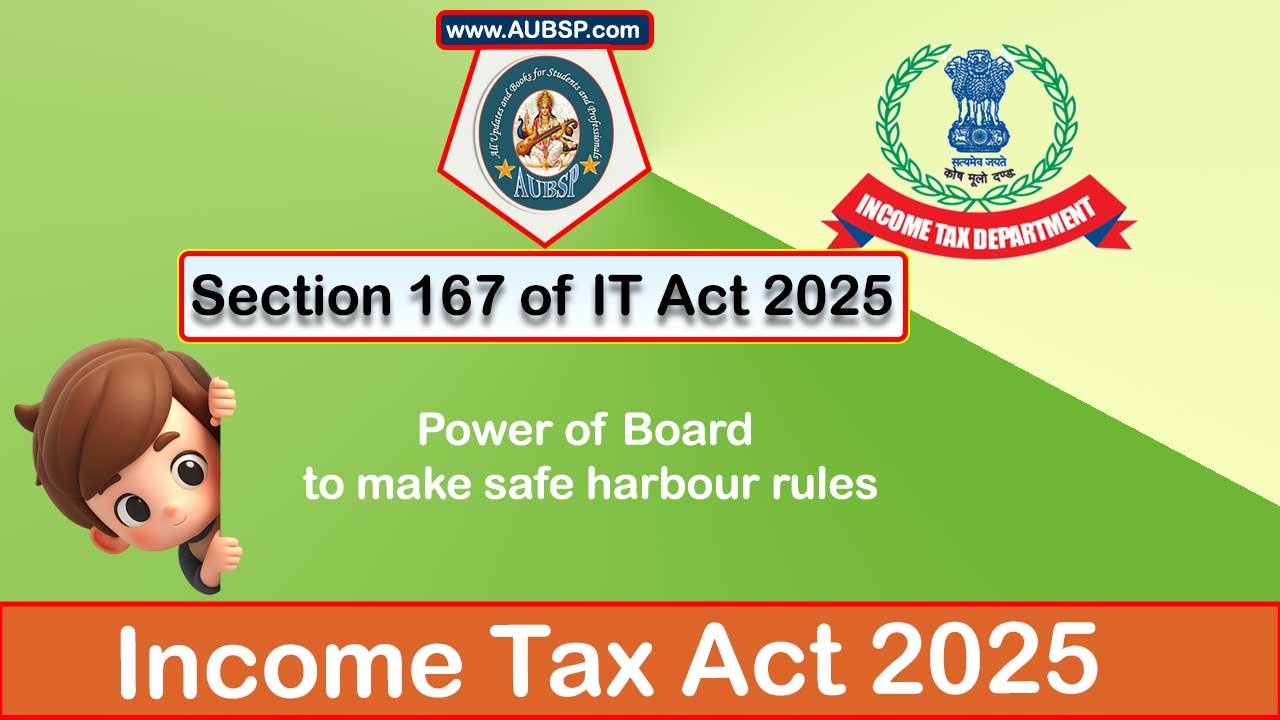Power of Board to make safe harbour rules
[Section-167 as per the Income Tax Act, 2025 (this Act) w.e.f. 1st April, 2026.]
Section 167(1) of Income Tax Act 2025
(1) The determination of—
- (a) income referred to in section 9(2); or
- (b) arm’s length price under section 165 or 166,
shall be subject to safe harbour rules.
Section 167(2) of Income Tax Act 2025
(2) For the purposes of sub-section (1), the Board may make rules for safe harbour.
Section 167(3) of Income Tax Act 2025
(3) In this section, “safe harbour” means circumstances in which the income-tax authorities shall accept,––
- (a) the transfer price; or
- (b) the income, deemed to accrue or arise under section 9(2),
declared by the assessee.
FAQs on Section 167(3) of Income Tax Act 2025
What does Section 167(1) of the Income Tax Act, 2025 specify?
It provides that the determination of income under section 9(2) or the arm’s length price under section 165 or 166 shall be subject to safe harbour rules.
What authority is empowered to make safe harbour rules under this Act?
The Board (i.e., the Central Board of Direct Taxes) is empowered to make rules for safe harbour under Section 167(2).
What is the meaning of “safe harbour” under Section 167?
“Safe harbour” refers to circumstances in which the income-tax authorities will accept the transfer price or income declared by the assessee, as stated in Section 167(3).
Which types of income are covered under the safe harbour provisions?
Safe harbour applies to income referred to in section 9(2) and arm’s length price determined under section 165 or 166.
Are the safe harbour rules mandatory or optional for taxpayers?
The section implies acceptance by the tax authorities of declared values in specified circumstances, but the practical applicability (whether optional or mandatory) would depend on the rules framed by the Board.
Can the Board modify or update safe harbour rules?
Yes, since the Board is empowered to make rules, it also has the authority to amend or update them from time to time.
Do safe harbour rules override regular transfer pricing assessment?
Yes, if conditions of the safe harbour are satisfied, the transfer price or income declared by the assessee will be accepted without further scrutiny.
Is advance approval needed from tax authorities to apply safe harbour?
The section itself does not mandate advance approval, but specific procedural requirements, if any, would be defined in the rules made by the Board.
Does safe harbour apply to both domestic and international transactions?
The section does not distinguish between domestic and international transactions. The scope will be specified in the rules framed by the Board.
What is the benefit of opting for safe harbour provisions?
It provides certainty and reduces litigation by ensuring that declared values are accepted by the tax authorities if conditions are met.
Can an assessee be denied safe harbour benefits?
If the assessee fails to meet the conditions prescribed under the safe harbour rules, they may not be eligible for the benefits.
Are safe harbour rules subject to judicial review?
Yes, like any subordinate legislation, safe harbour rules can be challenged in courts if they are ultra vires the Act or violate constitutional principles.
Does the term “transfer price” under safe harbour refer only to related party transactions?
Yes, typically “transfer price” refers to pricing in international or specified domestic transactions between associated enterprises, covered under section 165 or 166.
When do the provisions of Section 167 come into effect?
They are effective from 1st April, 2026.
Can the Board issue different rules for different classes of taxpayers under safe harbour?
Yes, the Board may frame differential rules depending on class of taxpayer, nature of transaction, or any other relevant criteria.

